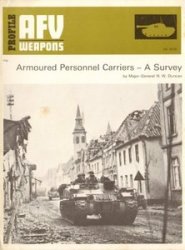On September 20 General Horii called together his commanders and praised them for their success in crossing "the so-called impregnable Stanley Range”. At the proper time they were "to strike a crushing blow at the enemy’s positions at Port Moresby”. The halt at loribaiwa would give the tired troops, many of them wounded and ill, a chance to regain their fighting strength. Most were hungry; little or no rice remained in the dumps. Horii had already ordered detachments to dig up native gardens in the area and sent parties over the mountains to bring up provisions from the rear. To block an Australian attack, he ordered his engineers to build a stockade of tree trunks.
The Australians did not attack; but no supplies came from the rear, no Zeros flew over. "An atmosphere of uneasiness,” noted Okada, "stole over the mountain, a feeling that things were not going well at Guadalcanal. On September 24 in a night of drizzling rain the blow fell. A signal commander came into Horii’s tent with a message from Imperial General Headquarters ordering Horii to withdraw his force from the Owen Stanleys to the coast at Buna.”
The reason for the order was a major defeat at Guadalcanal on September 15, in which the Kawaguchi Detachment had been virtually wiped out. Imperial General Headquarters decided to subordinate everything to the retaking of Guadalcanal. Once that had been accomplished, it would be possible to resume Operation "MO”. In the meantime, Horii’s mission was to defend the Buna beach-head.
For Horii, the order "to abandon this position after all the blood the soldiers have shed and the hardships they have endured” was agonising. He sent his chief-of-staff, Lieutenant-Colonel Toya-nari Tanaka, to break the news to the battalion commanders. Some of them almost rebelled, urging a desperate, singlehanded thrust into Port Moresby.
On September 25 the movement back over the mountains began. The order to withdraw had crushed the spirit of the soldiers, which, Okada reported, "had been kept up through sheer pride”. For a time they remained stupefied. "Then they began to move, and once in retreat they fled for dear life. None of them had ever thought that a Japanese soldier would turn his back on the enemy. But they were actually beating a retreat!”
As soon as they accepted this bitter fact, "they were seized by an instinctive desire to live”. Each tried to flee faster than his comrades. Passing by bodies of men killed in the fighting of early September, already rotting and covered with maggots, the soldiers stopped only to dig for taroes or yams. They found little; the fields had been dug up almost inch by inch. By the time they reached the crest of the Range, they were fleeing from starvation, a greater menace than the Allied planes roaring overhead or enemy guns rumbling in the rear.
To delay the Australian pursuit, which began on September 27, Horii ordered a rearguard battalion to make a stand on the heights above Eora Creek. There it was attacked by troops of the Australian 16th Brigade on October 21. Reinforced from Kokoda and Buna, it held out for seven days, long enough for Horii to evacuate Kokoda and set up his last defences, at Oivi and Gorari in the foothills between Kokoda and the Kumusi river.
At Oivi, strongly fortified by Colonel Yazawa, the Australians attacking on November 5 could make no headway; but at Gorari, where Colonel Tsukamoto was in command (Colonel Kusunose having been evacuated because of sickness and wounds), an Australian assault on November 10 succeeded, after heavy fighting. Yazawa’s position was now untenable. He withdrew his 900-man force after dark that evening over a little-known track leading north-east to the mouth of the Kumusi. With him was General Horii, who had been on an inspec-
V The luckier ones: Australian "walking wounded”.
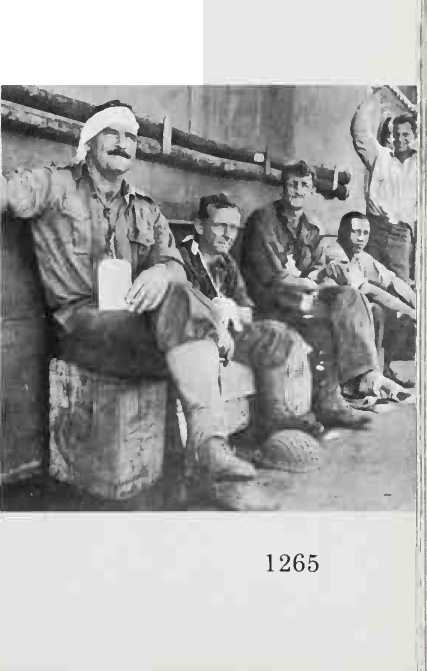
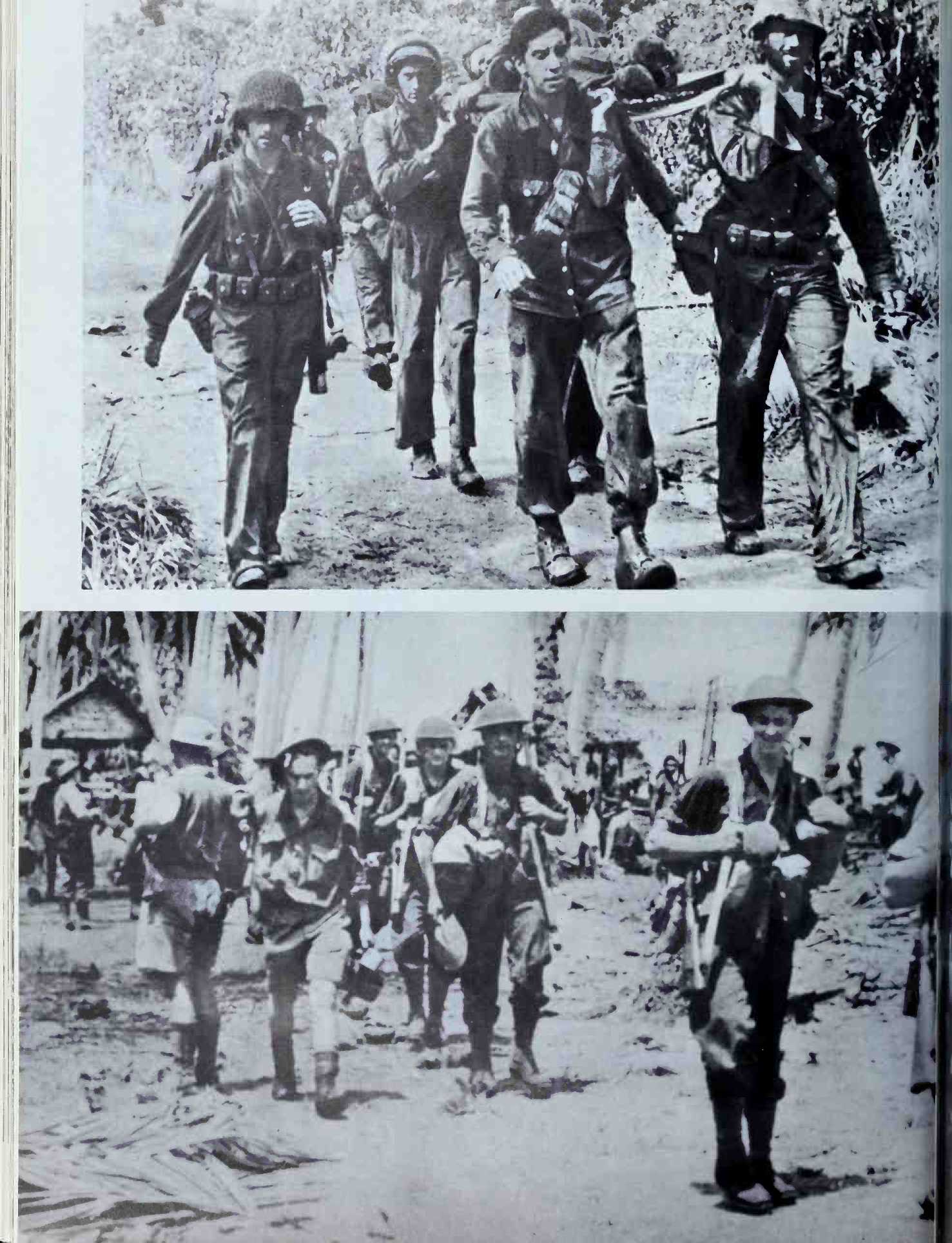
Tion trip to Oivi.
The rest of the South Seas Detachment, about 1,200 men, began crossing the Kumusi river on the night of November 12, guided by the light of a bonfire. They had no bridge. Incendiary bombs dropped from Allied planes had burned the wooden bridge built in August by the Yokoyama Force and defeated all attempts to replace it. The soldiers crossed in six-man folding boats, then pushed on in the darkness toward Buna.
Seizo Okada crossed with the vanguard. Stopping at a newsmen’s hut about halfway to Buna, he watched the "men of the mountains” as they moved along the road, day and night, toward the coast. "They had shaggy hair and beards. Their uniforms were soiled with blood and mud and sweat, and torn to pieces. There were infantrymen without rifles, men walking on bare feet, men wearing blankets or straw rice-bags instead of uniforms, men reduced to skin and bone plodding along with the help of a stick, men gasping and crawling on the ground.”
The stretcher-bearers, themselves too weak to carry stretchers, dragged the sick and wounded to the overcrowded field hospital near Buna and laid them on straw mats in the jungle. "The soldiers had eaten anything to appease hunger-young shoots of trees, roots of grass, even cakes of earth. These things had injured their stomachs so badly that when they were brought back to the field hospital they could no longer digest any food. Many of them vomited blood and died.”
Later, Okada learned that General Horii had drowned while on the march northwards with Yazawa. Horii, anxious to rejoin his men at Buna, tried to cross the lower Kumusi river on a log raft. In the swift current the raft carrying him and Colonel Tanaka overturned.
So ended, in tragedy, the overland march on Port Moresby. Misgivings about it had been felt by at least one officer at Imperial General Headquarters, Colonel Masanobu Tsuji, who warned, "Cross the mountains and you will get the worst of it.” At the end his verdict was, "a blunder”.
Though the Buna beach-head was reinforced from Rabaul and held out for several months. Operation "MO” was never resumed. Beginning early in October, the attention of Imperial General Headquarters was diverted from New Guinea and focused on Guadalcanal.
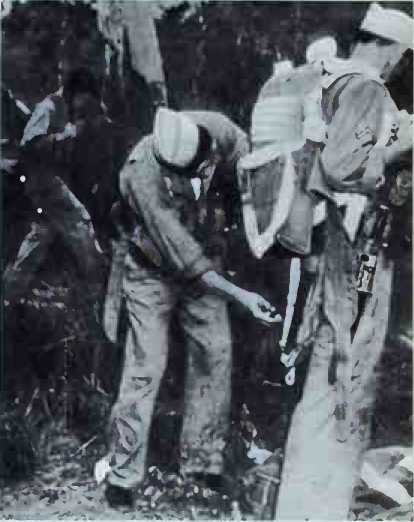
< < A Another American casualty on the Buna front.
<<V The confidence of victory. An Australian platoon advances. A Fitting out a paratrooper.
V The first hot soup after eleven days of combat for the victors of Buna.
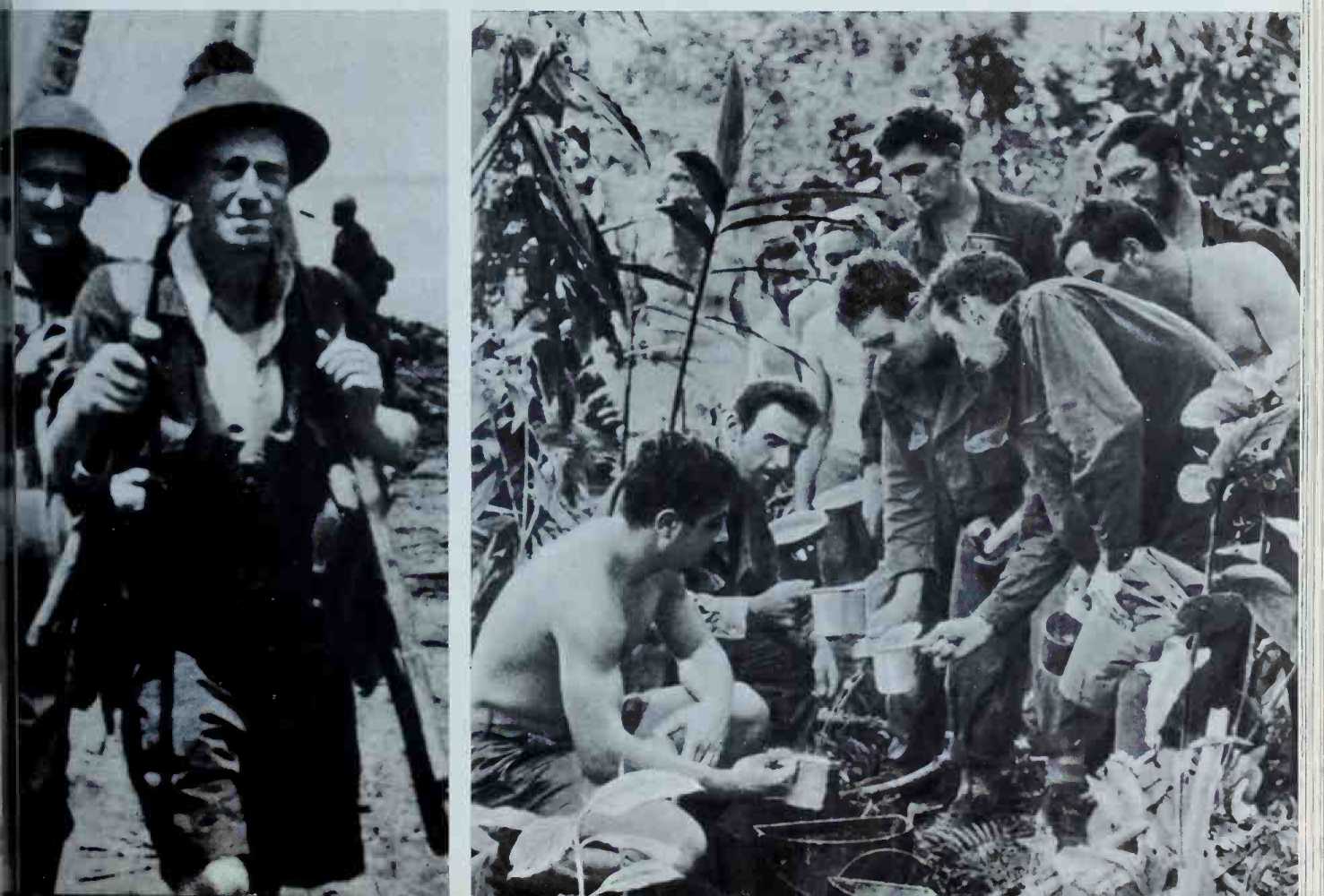




 World History
World History




